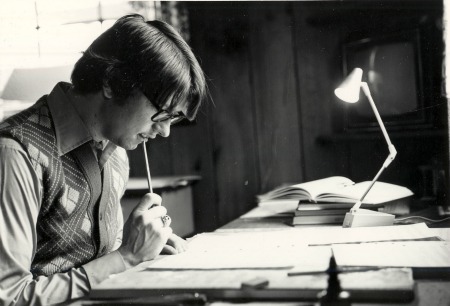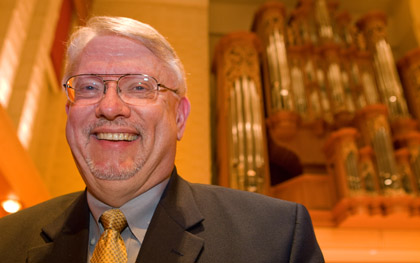The End of an Era

Dave Robbins Steps Down after 33 Years as Chair of the Department of Music
Greg Youtz’s first glimpse of Dave Robbins was him strolling down a hallway in Eastvold, while his two-year-old daughter toddled along at his side, clutching his finger.
“I remember thinking that Dave is not only this great dad to his kids, but that was an image the rest of us felt – like we were holding on to Dave’s finger too, and he was sort of leading us down this hall,” Youtz commented.
Robbins, who’s been at PLU for 45 years, is stepping down as Department of Music chair, a position he’s held for the last 33 years.
Dave came to PLU in the summer of ’69. He had cast a wide net in his job search but hadn’t found a fit. Then he got a call from Maurice Skones, the then current chair of the Department of Music, with an invitation to interview for a teaching position. He put him off and asked him to call back if the position wasn’t filled in a month. Exactly a month later (to the hour) he received the second call from Skones. He interviewed and the rest is history.
“I loved the campus, the colleagues were wonderful. At the time I was 23 or 24, so I thought ‘this would be a great first job’. Little did I know it would be my best job and my only job,” Robbins said.
THE 80s - A DECADE OF GROWTH
Robbins became chair in 1981, and his first project was to take the department from a small program identified solely with the Choir of the West, to a broader program, in terms of recruiting distance and program breadth and depth.
“People came because they heard and loved the choir, and people came because they were Lutheran,” Robbins said. “But we really didn’t do systematic recruitment. We didn’t do scholarship auditions; all of that was new to us in the 80’s.”
The department went from zero scholarship auditions, to where they are now with two and a half days of on-campus auditions every February. They receive 300 or more inquiries, which convert to more than 175 auditions each year.
“Dave is the conductor as well as the composer,” Youtz explains. “He sees what’s coming down the road, he can see from a long ways away what’s going to have to happen, so he’s able to help us adjust and shift and move so that we’re ready to meet it when it hits. It’s that sort of global vision from everything from state education policies to stuff on campus. He’s got the whole picture in his head.”
THE 90s - THE HOUSE THAT DAVE BUILT
In 1990 Mary Baker Russell gave the first naming gift to launch the new Music facility, which would be named the Mary Baker Russell Music Center.
Even in the early seventies, the department had clearly outgrown the small space they shared with theatre and communication in Eastvold. Youtz remembers buckets catching drips of rainwater while he lectured. Robbins wrote the very first report justifying a new fine arts music building, which was approved by the regents in 1978.
“The building had been a dream of this department since I got here,” Robbins said. “The joke about my predecessor was that the first-generation music faculty were all told there was a new building two years away. This was in the early seventies [he laughs] and the building was built in ’95.”
Originally, the building was intended to be built in one fell swoop, but with a change of PLU presidents, the project was phased.
“The joke I always tell is, in the academy the word ‘phased’ carries the subtext of ‘not in your lifetime’ so it was with incredible gratitude and surprise that two years later President Anderson said ‘we’re going to do phase II,’” Robbins said.
In 1995 PLU opened up what was appropriately called, for the TV of the period, the west wing. Two years later, in 1997, the north and south wings opened and by 1998 the organ had been completed.
“This is, I would argue, largely the building that Dave built. He was only a member of the committee, but he represented the music department,” Youtz said. “When I first arrived, they already had been working for a couple years and it was just around the corner. Literally, Dave worked on this for probably seventeen years.”
The committee consisted of everybody from the then president and Board of Regents, to the architects and PLU facilities representatives.
“The fact that we have this building, and that we got not only phase one, but phase two – that is largely due to Dave’s tenacity and just reminding all of us, ‘hang in there guys, it’s coming,’” Youtz remembers.
THE 2000s – A NEW GENERATION
With the new millennium, there came a generational sea change in the music faculty. With two exceptions, the current faculty was hired between 2000-2010.
In the 80’s, Dave inherited a department full of performers. PLU’s music faculty resembled that of a conservatory. Positions for theorists, historians or ethnomusicologist had never existed.
“I think Dave enlarged [the department] and strengthened it,” Youtz recalls. “We remain, somewhat unusually, a faculty of people who are involved in the making of music.”
The curriculum is all made under Robbins’ organization. Every ten years the department goes through an accreditation process for the National Association of Schools of Music. Dave’s done four accreditation reviews: one in the eighties, nineties, two thousand and the current one for this decade. As chair, he completes a voluminous self-study, organizes a visit, and responds to visit concerns.
“I had done three of those in the course of my time as chair. I’d actually helped write the initial one with Maurice Skones,” Robbins said. “I didn’t necessarily plan to hang around for the fourth one, but it was looming. I kind of thought, that’s a good thing to end my tenure on. To make that my final, big, big project.”
THE NEXT PHASE
Robbins is stepping down as chair and will take his first official sabbatical.
He is looking forward to taking the time to reacquaint himself with high-end art music, mastering notation software, and converting his compositions to digital format.
“Of course, I have a whole trunk-full of compositions from over the years,” Robbins explains. “I was trained with ink on vellum for writing music, which shows you how technology changes.”
If all of that coalesces, he would consider going back to writing some original compositions.
“I’ve got several projects that I’m anxious to do,” Robbins said. “I jokingly say that I’m going to take the memos I’ve written for the last gazillions years and bind them as Opus 17, 18 and 19, because it’s in those memos that I place my creativity that I used to put into music composition.”
The Department of Music will celebrated Dave Robbins’ tenure with a tribute concert on May 22 at 8pm in Lagerquist Concert Hall.





Social Media